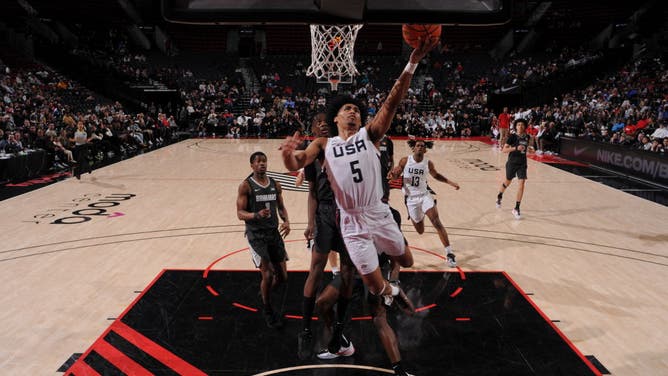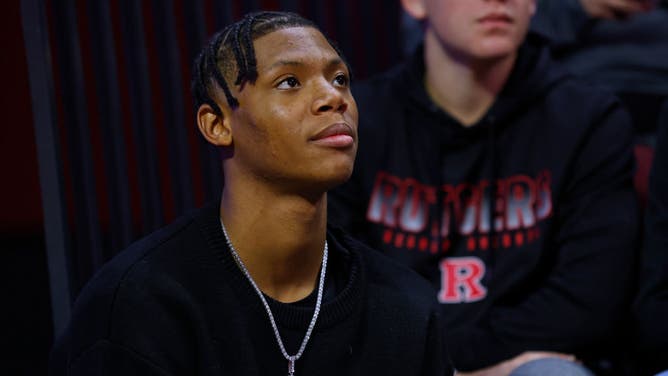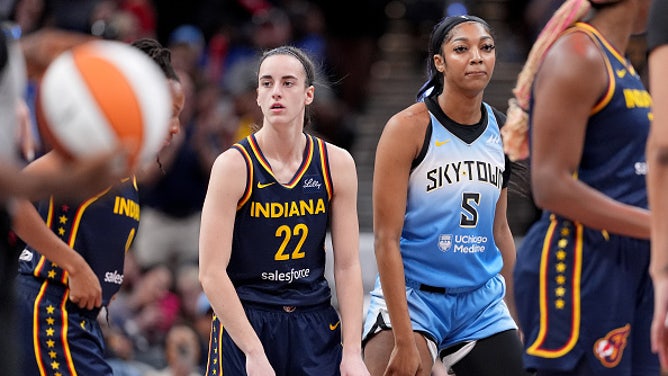Inside Caitlin Clark And Angel Reese's Impact On Men's Basketball
College basketball is coming off of a brief era of matriarchy. But is it even over?
The 2024 college basketball recruiting class is coming into the sport in the aftermath of a historic popularity shift. This year, for the first time in March Madness history, more people tuned in to watch the women's championship game than the men's.
The NCAA Women's final had 18.9 million viewers, while the men had just 14.8 million.
There is no denying it, Caitlin Clark and Angel Reese were the reasons for this. A combination of star power and controversy fueled a surge in demand for women’s basketball. Online conversations ran rampant over the two players, hitting sensitive pressure points in social and political conversation, for not one, but two Final Four runs in a row.
Now, if there is a popularity contest between the two sports, the next generation of men's basketball stars are paying close attention to the other side as they begin their college careers.
For some of the top men’s recruits, the lines between the sports are blurring.
"I just think we’re all the same, and to categorize us as different, because we’re all the same people at the end of the day," said Dylan Harper, the No. 2 nationally-ranked recruit in the class of 2024, who committed to Rutgers, declining offers from powerhouse programs Duke, Indiana and Kansas.

Dylan Harper #5 of Team USA drives to the basket during the game against Team World during the 2024 Nike Hoop Summit on April 13, 2024. (Photo by Cameron Browne/NBAE via Getty Images)
Harper told Fox News Digital at Rutgers men’s basketball media day on Tuesday that he has gotten advice from Michael Jordan since he was a kid, through various phone calls set up by his father, Ron Harper Sr., who won five NBA championships and three as Jordan’s teammate on the Chicago Bulls in the late 1990s. However, Jordan’s advice was only half the story. Dylan’s mom, Maria Harper, has worked as a women’s basketball coach since Dylan was a kid, and he has looked to that sport for inspiration just as much over the years.
Now, as a college player, that half of his experience could play into his leadership.
"We all want to be a leader in any aspect that we can," Harper said when asked if he would look to Clark and Reese as leadership role models during his time at Rutgers.
Harper is not alone among top recruits or his own teammates.
Ace Bailey, the No. 3 ranked recruit in the nation this year who committed to Rutgers before Harper, declining an offer from powerhouse Kentucky, is with him. Bailey told Fox News Digital at his media day on Tuesday that, unlike Harper, he only started following women’s basketball in "the last three years" because of players like Clark and Reese.
"With their leadership, especially Clark, she brings a lot of energy to get her team going, whether it’s a long shot, jump shot," Bailey said.
Bailey then pointed to a specific part of Clark’s game, regarding how she talks to opponents on the court, especially against Reese and Clark’s other former LSU rival, Flau’jae Johnson.
"She talkin’ to em in negative ways, but it’s positive toward her teammates, it’s just the way she does that, especially with Angel Reese. They’re competitive, Flau’jae, they all competitive, they just compete and they love the game," Bailey said.

Ace Bailey, a five star recruit committed to the Rutgers Scarlet Knights watches as the Scarlet Knights play of the Stonehill Skyhawks at Jersey Mike's Arena in December, 2023. (Photo by Rich Schultz/Getty Images)
Reese and Johnson beat Clark’s Iowa Hawkeyes in the national championship game in 2023 but then lost to Iowa in this year’s Final Four.
Clark’s reputation as a trash talker has been publicly called out by Las Vegas Aces head coach Becky Hammon, who said, "They jaw at each other, nobody talks more crap than Caitlin too … it’s a different generation!" of Clark and Reese at a press conference on June 27.
However, Bailey is also impressed by how Clark handles trash talk.
"She don’t worry about nothin’ what other people talk about, you can tell she missed some shots in the one game, but going into the next game she was on fire, she ain’t worried about anybody else, she knows what she’s capable of and just keeps getting better," Bailey said.
Despite Clark’s reputation, the fact that she became the unanimous WNBA Rookie of the Year this year and her alleged trash talking skills, Bailey said he would still choose to pursue Reese for advice if he could only talk to one big women’s basketball star.
"I would probably talk to Angel Reese, her competitiveness for sure, what keeps her driving," Bailey said.
As the team's top recruits, Harper and Bailey are less focused on drawing national attention to themselves as individuals the way Clark and Reese did this past year.
When asked what they want the country to see in the inevitable national coverage the program is set to receive this year, both Bailey and Harper insisted that they hope the attention goes to their teammates instead of them.
"You can’t win alone, you gotta win as a whole group of guys," Harper said.
"I want them to see my team!" Bailey added.
The recruits and head coach Steve Pikiell are likely banking on this approach to help keep the team grounded and focused on a possible historic run through the NCAA tournament this year. However, whether that approach will be enough to help the men’s tournament compete with the women’s tournament in terms of TV ratings is yet to be seen.
While Clark and Reese have moved on to the WNBA, women’s college basketball is still anchored by higher-profile stars like Paige Bueckers, Juju Watkins, Hailey Van Lith and Johnson. This is because, unlike the pipeline between men’s college basketball and the NBA, the WNBA requires players to be at least 22, have completed their college eligibility and graduated from a four-year college. The one-and-done rule in the NBA, allowing players to declare for the draft after just one college season, has drained the sport of long careers of top pro prospects for years.
Harper, Bailey and Duke freshman Cooper Flagg, who was the No. 1 ranked recruit nationally this year, are set to be the biggest stars of this men's college season, but each of them could be in the NBA Draft by 2025.
Outside of that, the women’s game might have another fundamental advantage in terms of engaging TV viewership, according to ESPN college football women’s basketball broadcaster Holly Rowe.
Rowe said last month that men’s basketball should even consider rule changes to make it more like women’s basketball.
"I don’t know if the men will overtake them," Rowe said. "I love that the women play quarters, the game moves faster, it’s more exciting. You can sit at a men’s college basketball game, and then you go to a women’s, and you’re just like, ‘I don’t know, it just flows better.’ So I do think that the men’s game could benefit from some rule changes to make the game flow a little bit better."
Men’s college basketball has been played with two halves instead of four quarters since 1954. It has become one of the sport's iconic signature structures that sets it apart from other levels of basketball. Yet, Rowe believes that the viewing experience would be improved by following the same four-quarter structure used by the NBA, WNBA and women’s college game.
Whether the NCAA ends up changing the men’s rules to be identical to the women’s game at any point over the next few years will be telling on just how big of an impact Clark and Reese left on the landscape of college basketball during their heated college rivalry.
It might also be telling as to how big of an impact Clark in particular can have on the pro sports landscape.

INDIANAPOLIS, INDIANA - JUNE 16: Caitlin Clark #22 of the Indiana Fever and Angel Reese #5 of the Chicago Sky look on during a game at Gainbridge Fieldhouse on June 16, 2024 in Indianapolis, Indiana. (Photo by Emilee Chinn/Getty Images)
In just her rookie season in the league, Clark has proven she can make the WNBA competitive with the NFL – long seen as the unchallengeable American sports juggernaut in terms of TV demand.
Earlier this month, Clark’s Indiana Fever played in front of a TV audience of 1.26 million viewers, in a game against the Minnesota Lynx that was played at the same time as a Week-1 Friday night NFL game between the Philadelphia Eagles and Green Bay Packers.
However, things got even more unusual on Sunday, when Clark’s first ever playoff game against the Connecticut Sun was watched by an average of 1.84 million, despite the fact that it took place during multiple NFL Sunday afternoon games, and despite the fact that Clark’s game turned into a blowout in the second half.
Reese was not even playing opposite of Clark in those matchups.